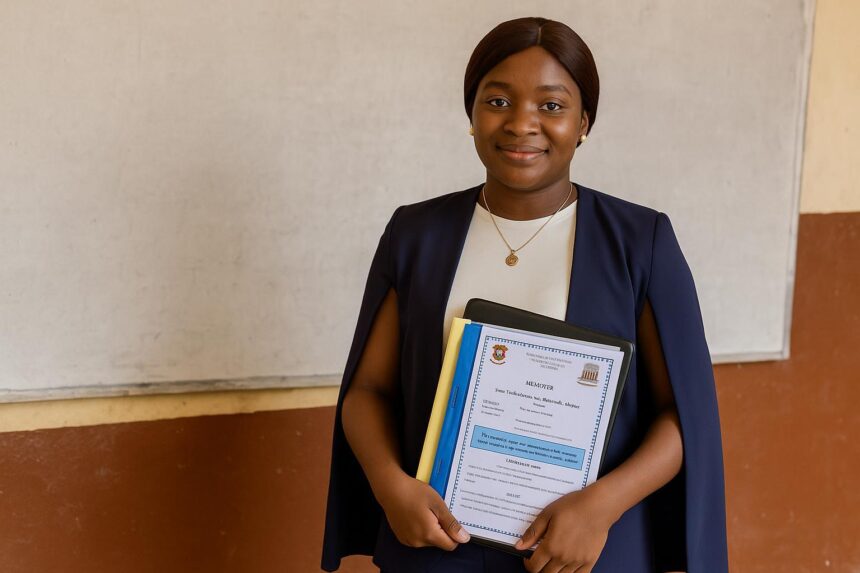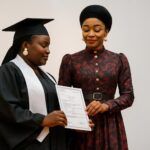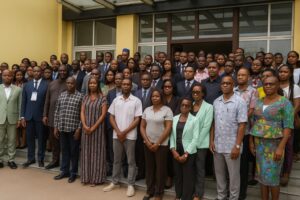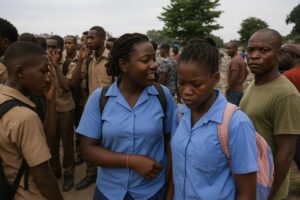A spotlight on education at UMNG
Soft afternoon light filled the economics faculty hall on 12 September as Marien-Ngouabi University hosted a public thesis defence that quickly drew attention beyond academia.
- A spotlight on education at UMNG
- Rigorous numbers behind a social issue
- Findings that challenge common ideas
- Safety, history and peer pressure matter
- Meals first, messages next
- Targeted financial support
- An enthusiastic academic bench
- A voice rooted in personal conviction
- Possible ripple effects for policy
- Next steps and broader relevance
- Why the study resonates now
- Community voices echo the findings
- Data without sensationalism
- Young scholars lifting national debate
- An invitation to collective action
Reine Mervine Gankama, pursuing a master’s in quantitative economics, presented a 130-page study titled “The Weight of Socio-Demographic and Extra-School Factors on School Dropout in Congo”.
After a lively hour of questions, the jury granted the young economist a “Très bien”, averaging 16 out of 20, underlining both scientific merit and social relevance.
Rigorous numbers behind a social issue
Supervised by Professor Rufin-Willy Mantsie and lecturer M’Piayi Auguste, the research relied on a carefully built sample of 202 pupils distributed across Brazzaville’s nine districts.
Gankama processed the responses with econometric models to isolate, variable by variable, what most predicts the moment a child leaves school.
The quantitative approach, rare in local education studies, offered what jury president Samba Bruno called “a compass for decision-makers eager for evidence-based policies”.
Findings that challenge common ideas
Among the strongest signals, the father’s education level repeatedly emerged as a safeguard against dropping out before upper secondary school.
The quality of daily meals, often relegated to household matters, proved nearly as decisive, statistically outweighing even class size or travel distance.
Parents’ occupations, especially informal or precarious jobs, also correlated with early departure, reminding observers that the classroom rarely erases economic realities.
Safety, history and peer pressure matter
Outside the home, insecurity and juvenile delinquency scored high in explaining departures between collège and lycée.
Pupils who repeated a grade, or whose own parents had once quit school, displayed a noticeably higher probability of giving up.
The convergence of past and present pressures paints, in Gankama’s words, “a mosaic where one fragile tile can break the whole pattern of learning”.
Meals first, messages next
On the intervention side, the thesis lists school canteens as a first-line defence: one guaranteed meal could keep thousands of children seated through the afternoon.
Gankama argues that feeding programmes, targeted at low-income zones, secure attendance while relieving families of an extra cost.
The economist also stresses sustained communication campaigns so parents grasp how their own involvement shapes outcomes long before national exams.
Targeted financial support
Beyond nutrition, the paper pleads for state-backed scholarships finely tuned to poverty indicators rather than blanket aid.
Such bursaries, the author suggests, could cover uniforms, basic supplies and transport, directly neutralising costs singled out in her regressions.
Although budgets remain tight, the jury agreed that focused spending beats scattered generosity when every franc must count.
An enthusiastic academic bench
The panel, comprising Samba Bruno, Mavoungou Soula Ulrich and M’Piayi Auguste, praised the methodological clarity and confident defence.
Ulrich lauded the “courage of chewing tough numbers for a subject often narrated only through anecdotes”.
As cameras clicked, the group posed with the fresh graduate, hinting that this moment could influence future doctoral paths and collaborations.
A voice rooted in personal conviction
Gankama openly links her choice of topic to a “deep attachment to Congolese schooling” sparked by childhood observations of classmates who vanished from classrooms overnight.
She believes rigorous evidence can transform such disappearances from inevitable stories into solvable problems.
“Our children’s horizon should not narrow because a meal or a notebook is missing,” she told reporters after the session.
Possible ripple effects for policy
Policy officers from the Ministry of Primary and Secondary Education, present in the audience, signalled interest in integrating the findings into upcoming retention strategies.
While no immediate commitment was announced, informal talks hinted at pilot canteen programmes in districts mirroring the study’s sample.
For observers, the alignment between academic output and administrative ears marked a positive sign for data-driven reforms.
Next steps and broader relevance
The researcher plans to extend her dataset beyond Brazzaville to semi-urban departments, hoping to capture regional nuances.
She also aims to publish in peer-reviewed journals, opening Congolese questions to an international readership and sparking comparative work.
In the meantime, copies of her thesis circulate among NGOs working on child protection and community development.
Why the study resonates now
The new school year often rekindles debates on attendance, fees and classroom safety; Gankama’s fresh statistics arrive precisely during that seasonal reckoning.
Parents juggling higher living costs, and teachers facing overcrowded rooms, find in the study figures that mirror daily experience.
Its timing therefore amplifies calls for swift, practical measures rather than distant pledges.
Community voices echo the findings
Outside the university gates, guardians waiting for pupils described food scarcity and transport fares as real obstacles, unconsciously validating the research outcomes.
One mother from Makélékélé said she sometimes kept her son home when breakfast lacked, fearing he would faint before noon.
Such testimonies underline the bridge between econometric tables and lived streets.
Data without sensationalism
Throughout the defence, Gankama avoided dramatic rhetoric, instead letting coefficients and probabilities speak.
That restraint, applauded by faculty, aligns with a broader media shift towards under-stated yet service-oriented reporting on social issues.
For a public often overwhelmed by statistics, the thesis offers clear, relatable signposts.
Young scholars lifting national debate
UMNG officials emphasise that supporting emerging researchers like Gankama strengthens Congo’s capacity to craft tailor-made solutions instead of borrowing one-size-fits-all models.
Her work showcases how local universities can feed development agendas, a goal championed by national authorities in recent years.
Each additional study, they argue, refines the roadmap towards inclusive growth.
An invitation to collective action
Ultimately the thesis turns numbers into a call for shared responsibility among state, families, schools and communities.
If followed through, its recommendations could help keep more children in class, building a workforce ready for tomorrow’s challenges.
For now, Reine Mervine Gankama’s success story reminds Brazzaville that solid research is an essential first step toward lasting educational progress.






















